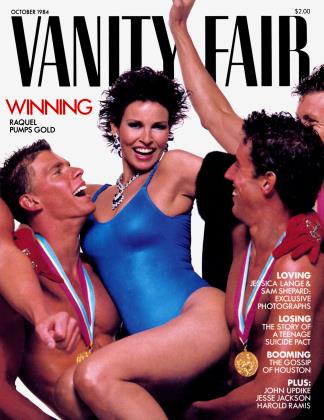Sign In to Your Account
Subscribers have complete access to the archive.
Sign In Not a Subscriber?Join NowFor the Love of Eleanor
Jessica Mitford
Joseph P. Lash's A World of Love: Eleanor Roosevelt and Her Friends 19431962 (Doubleday) holds a fascinating story for readers with the fortitude to persevere and dig it out. The title of this very long book, A World of Love, is taken from a phrase with which Mrs. Roosevelt often closed her letters, and clues us to Lash's intention: an exploration, drawing largely on his subject's correspondence, of Eleanor's passionate romantic attachment in the last two decades of her life.
The many early chapters cover familiar territory: Mrs. R.'s difficult children; the Roosevelts in wartime; F.D.R.'s death; Mrs. R.'s emergence as a world figure. It is not until almost halfway through the book that we meet Dr. David Gurewitsch, who at age forty-five became the sixty-three-year-old Mrs. Roosevelt's last great love in a one-sided romance that endured until her death, fifteen years later.
In his introduction to Love, Eleanor, the companion volume to this one, Lash ponders the function of a biographer: "When does discussion of unexplained anomalies in the subject's behavior become gossip instead of analysis?'' In A World of Love, Lash proves to be adept at both. While there is plenty of gossipy material in the doting Mrs. R.'s exchange of love letters with David Gurewitsch, Lash also comes through with a persuasive analysis of her curious penchant for unobtainable men. Here, for example, in a letter from David to Mrs. R. (July 1948): "1 have found you during this time—and 1 adore you.... Your existence has changed much in my life." Lash's comment: "He loved her but she understood she was not first in his life, and that the condition of being allowed to love him, as in the case of Earl |Miller] and myself, was to befriend and draw in the women to whom he was and would be romantically attracted. She was prepared to pay the price." The price was heavy, as we see in this letter from Mrs. R. to David, who was planning to go on holiday with a woman friend (August 1951): "I realize I cannot give you what a young woman can but till you are fairly sure of what you want, do you really want what you are now planning?" Lash: "Extraordinary letter—or rather extraordinary woman." He further surmises that Eleanor's problem was "the inability of men to desire her sexually."
Mrs. R., it develops, lived not so much in a world of love as in several interconnecting worlds of love, into which she drew the wives and mistresses of the men in her life. For years she had courted Joe Lash while assiduously cultivating the friendship of his fiancee (later his wife), Trude Pratt. When she transferred her affections to David Gurewitsch, she adopted the same technique, wooing his first wife, Nemone; then Martha Gellhorn, with whom he was having an affair; and finally Edna, who became his second wife—in a wedding given by Mrs. R. in her home.
As Lash sees it, "the tragedy of her life was that, though she helped us all in our romances, for her there was no love 'but borrowed love.'. . . What is one to make of Eleanor's falling in love with men whose romances with other women she abetted?. . .One cannot escape, however, her talent for loving men who proved to be—and she encouraged them to be—inaccessible."
And what, I can't help wondering, is one to make of those "other women," bound by invisible bonds of love to Mrs. R. and apparently amenable through their menfolk to accommodating her every whim? Speaking for myself, I should have found the role of a Trude or an Edna extremely irksome— those incessant holidays abroad and evenings at home that they were commanded to attend! There is no indication in this book that they ever balked, so perhaps it was all for the best.
Joe and Trude and David and Edna and Eleanor (and occasionally others) supply the plums in an otherwise stodgy pudding. Granted, Lash's job of sorting and selecting from a vast archive must have been daunting; and, as even her devoted admirers must concede, Mrs. R. was no literary stylist. For those who remember her "My Day" column, the letters will strike a familiar note: pedestrian, platitudinous outpourings, full of goodwill, lit by an occasional flash of sharp, original observation.
But why do we have to plow through page after page of snore inducers like this, just one example out of many: "E.R. to Joseph P. Lash, October 13, 1950: I love you both & hate not seeing you more often. Perhaps you could both lunch with me next Tuesday. I don't think I'll have to go to the U.N. & I could meet you anywhere you both would like to go & find convenient."
Fortunately, history does not relate whether they could or couldn't have lunch on Tuesday or, if so, at what convenient place. Had their answer been preserved, you can be sure it would have been chucked in.
My recommendation: Read A World of Love for its much intrinsic interest. But you may itch to wield a large editorial pencil as you go.
 View Full Issue
View Full Issue












Subscribers have complete access to the archive.
Sign In Not a Subscriber?Join Now